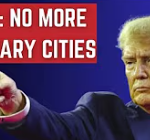In the world of international trade, there’s a difference between leadership and theatrics. This past week, President Trump unveiled what he’s calling “Liberation Day” tariffs—a no-nonsense, America First policy aimed at leveling the playing field, protecting American jobs, and reviving manufacturing. It was a bold, calculated move by a man who understands leverage.
The Ontario Premier, known more for volume than vision, erupted in a press conference that sounded more like a bad mob movie than a policy response. “We’re gonna make sure that we inflict as much pain as possible on the American people,” Ford fumed to reporters. Not a statement of strength—just a desperate attempt to rattle sabers that no one believes he can actually swing.
It was the political equivalent of trying to punch a tank with a foam bat.
When Tariffs Hit, Ford Threatens the Lights
Trump’s tariffs target Canada’s automotive exports—a smart move given America’s heavy reliance on foreign car manufacturing while our domestic plants sit idle. Ford’s answer? Threatening to shut off electricity exports from Ontario to U.S. states like New York and Michigan. According to New York Post, such a move would impact more than 1.5 million American homes and businesses.
Let that sink in. Ford’s retaliation isn’t just misguided—it’s dangerous and unstable. Shutting off power in a fit of international outrage sounds less like diplomacy and more like something out of a Bond villain’s monologue. But the real kicker? Within days, Ford backed down when President Trump made it crystal clear: any hostile act would result in swift and severe consequences.
That’s how real leadership responds to empty threats.
Ford’s “Team Canada” Fantasy Falls Apart
Ford later tried to spin the tantrum into a plan, calling for a “Team Canada” approach with PM Mark Carney to coordinate retaliatory tariffs and economic strategies. According to the Economic Times, Ford encouraged Canada to specifically “target American cars”—as if slapping tariffs on Fords, Chevys, and Teslas sold in Canada would somehow reverse the laws of economics.
Ford’s logic? “We buy as many cars off the U.S. as we sell down there.” The truth? America’s economy is vastly larger, more resilient, and far less dependent on Canada than the other way around.
Canada needs U.S. trade. The U.S. does not need Doug Ford’s grandstanding.
Trump’s Tariffs Are About Strategy, Not Spite
Trump’s “Liberation Day” tariffs—set to go into effect April 2—are not driven by emotion. They’re a targeted effort to revive domestic industry and reclaim economic sovereignty after decades of being taken advantage of on the global stage.
You can dislike Trump’s style, but you can’t deny the results: U.S. jobs are returning, wages are climbing, and supply chains are shifting home. Canada is being asked to meet America halfway. Instead, Ford would rather light a match and threaten the power grid.
This Isn’t How You Negotiate With the U.S.
While Trump plays chess—anticipating every reaction, understanding leverage, and using economic policy as a precise tool—Doug Ford plays Whac-A-Mole. Swinging wildly at anything American that moves, hoping something sticks.
But here’s the truth: Canada doesn’t win this way. Retaliating against American consumers or industries only isolates Canadian businesses and deepens the divide. And if Ford really cared about protecting his constituents, he’d be sitting at the table negotiating—not barking threats into microphones.
Final Thoughts
Trump’s tariffs aren’t about punishing Canada—they’re about fairness. About putting American workers first and rebuilding what decades of globalist policy eroded. Doug Ford’s job isn’t to throw tantrums. It’s to represent his people with clarity and strength.
Threatening to shut down power and harm Americans isn’t strength—it’s desperation. And it’s time Canada wakes up and realizes that bluster won’t beat strategy.
WE’D LOVE TO HEAR YOUR THOUGHTS! PLEASE COMMENT BELOW.
JIMMY
Find more articles like this at steadfastandloyal.com.
Having trouble? If your comment doesn’t post, submit another comment right after it that says: Jimmy, please approve my comment that didn’t post.














Let’s play tit for tat Canada. You want to cut power? How about the US stopping all shipments of medicine and medical equipment from American companies and no medical treatment in America for Canadian patients who come here because they can’t wait for Canada’s overloaded healthcare system.
Joseph Edelen
Vancouver, Washington
The Trump tariffs are no higher than current tariffs levied on US good, into these countries. Is it wise to threaten our electrical supply ? It is always unwise to force customers to find alternatives.
Joseph Edelen, what you propose doesn’t do anything but hurt people and business. Sure we should do something that affect’s their government like anything we GIVE them or special deals. But hurting their citizen’s is just mean as most Canadian’s are good people. Likewise stopping medicines and medical equipment denies those American companies their sales. Tariff’s and extra fee’s to do business with us is the way to put pressure on the Canadian government..
When tariffs hit, Hyundai builds car plants in the US, and a steel mill to provide materials. That means domestically-produced car include Honda, Toyota, and soon Hyundai.